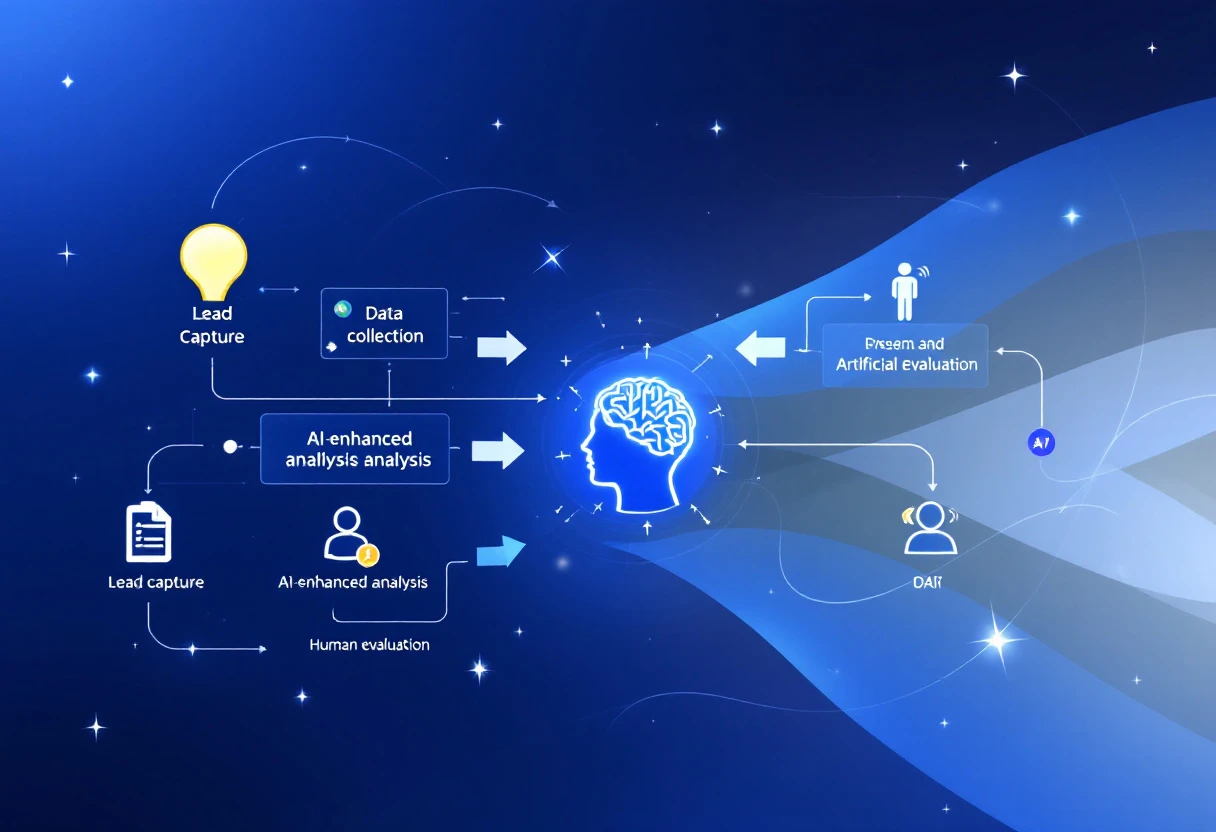
Are you looking to enhance your insurance lead qualification efforts? In today's competitive market, effective lead qualification is paramount for increasing conversion rates and optimizing operational efficiency. Embracing AI technologies can empower your agency to automate processes, analyze data, and engage potential clients in real-time. Discover how integrating AI can transform your lead qualification strategies and ultimately drive growth.
The insurance sector faces unique challenges in lead qualification. Potential leads often come from various channels, making it difficult to efficiently assess and nurture each one. A report found that nearly 40% of leads never convert due to improper qualification processes. This inefficiency leads to wasted resources and valuable time spent on leads that do not have genuine potential.
Traditional methods often rely on manual follow-ups and subjective assessments. Sales teams may overlook high-quality leads while pursuing less promising ones. It's imperative to analyze data effectively and prioritize leads that are truly inclined to purchase. This calls for a more systematic approach to lead management, especially considering that about 63% of new insurance agents fail within their first three years due to insufficient lead qualification.
Consider the case of a mid-sized insurance company that relied solely on manual processes for lead qualification. They experienced a significant drop in sales conversion rates, with only 15% of qualified leads actually making a purchase. This led to frustration and increased turnover among sales staff. Using AI tools could have dramatically changed this outcome, allowing the team to focus on leads with higher conversion probabilities.
AI Front Desk offers a solution with its Automated AI Receptionist. By integrating AI into the process, companies can automate the initial lead qualification steps, ensuring that only the most promising prospects are passed on to human agents. This automation not only saves time but also reallocates resources towards higher-value tasks.
Incorporating automation in lead qualification is essential for optimizing operational efficiency. Here are several reasons why businesses should consider this approach:
According to research, companies that implement AI-powered solutions in their client interactions see a 20-30% increase in lead conversion rates. This statistic underscores the potential of tools like the Automated AI Receptionist to transform how businesses manage insurance lead qualification.
To leverage AI effectively, businesses should start by integrating customer relationship management (CRM) systems with AI capabilities. This can streamline the process and ensure that every interaction is personalized and timely. Most importantly, automating lead qualification processes frees up agents to concentrate on closing deals rather than chasing down leads.
Ultimately, adopting AI in lead qualification is no longer just a choice but a necessity in today's competitive landscape. Those who fail to adapt risk falling behind while innovative companies will surge ahead, redefining what’s possible in customer engagement.
Understanding potential leads starts with data. AI excels at handling vast amounts of information quickly. Through data analysis, AI tools can sift through demographics, past interactions, and behavioral patterns. This allows for knowledge-driven strategies in insurance lead qualification.
A practical example is using predictive analytics algorithms that analyze historical data to identify key traits of high-value customers. For instance, if previous clients with similar profiles have a 70% conversion rate, targeting leads fitting that profile dramatically improves outcomes. According to research from McKinsey, companies leveraging AI for lead qualification see up to a 50% increase in sales productivity.
Moreover, AI-driven platforms allow insurance agents to automate the collection of relevant data, including inquiries and application inconsistencies, thus freeing up time for agents to engage meaningfully with qualified leads. Discovering what data to analyze and how best to use it is critical. Read more about effective qualification techniques to maximize results.
The evolution of AI capabilities has made predictive modeling crucial in qualifying leads. By using algorithms that analyze patterns, agents can forecast a lead’s likelihood to convert. This allows agents to triage leads effectively. A study by Boston Consulting Group revealed that predictive modeling could improve conversion rates by as much as 30% in the insurance industry.
Imagine a scenario where an insurance agent receives a list of potential leads ranked by their chances of conversion. With predictive modeling, an agent can focus their energy where it’s most likely to yield results. This ensures that valuable resources are directed towards leads that are not only interested but also qualified.
The technology is highly adaptable; for instance, advanced models like GPT-4 can help analyze written content and social media interactions. It identifies sentiment and engagement levels, shedding light on client needs. Agents can then tailor their messages to enhance connection and rapport. If you're curious about how to implement predictive analytics effectively, check out our guide on AI's impact on sales strategies.
Customer interactions are pivotal in lead qualification. AI can enhance these engagements by automating responses and ensuring timely follow-ups. With tools like chatbots, insurance agencies can respond to queries instantly, building a better experience for potential clients.
This automation not only speeds up the qualification process but also provides actionable insights. For example, after interaction analysis, agents can see which questions are frequently asked. This information helps refine the qualification criteria and the sales approach, allowing for tailored experiences. An internal study at a leading insurance firm showed that using chatbot automation reduced response times by 80%, leading to higher satisfaction among leads.
With AI Front Desk, incorporating an Automated AI Receptionist can streamline your client interactions, effectively qualifying your leads without losing the personal touch. To learn about the broader benefits of using AI in your operations, consider examining our article on AI’s role in customer service.

Integrating AI across the spectrum from data analysis to customer interaction not only enhances the qualification process but leads to smarter decision-making. By adopting these strategies, insurance agents can focus on building relationships with high-value clients instead of sifting through endless data. This shift not only improves conversion rates but also creates a more efficient work environment.
Imagine potential clients reaching out at all hours. Most conventional methods can't accommodate this need, leading to missed opportunities. With an automated AI receptionist, agents can engage leads around the clock, ensuring no inquiry goes unanswered. This constant availability is crucial for lead generation strategies. Statistics show that companies responding to leads within five minutes are 100 times more likely to engage compared to those who wait longer. This is where an AI solution shines.
The impact of 24/7 functionality can be illustrated through a practical example. A local insurance agency implemented the Automated AI Receptionist and reported a 30% increase in captured leads within the first month due to immediate response times.
Handling multiple leads simultaneously is a challenge with traditional methods. An automated AI receptionist can manage unlimited parallel calls, allowing agents to focus on nurturing leads rather than scrambling to respond. This feature can drastically improve the overall efficiency of insurance sales processes.
With the ability to field various inquiries at once, agents can prioritize more urgent matters while the AI addresses simpler requests. For instance, while one agent consults with a client on policy details, the AI can take calls from additional leads. The advantage is clear: faster responses and higher customer satisfaction, leading to increased conversion rates.
Not every lead can be captured at the moment of contact, but intelligent voicemail systems can change that. An automated AI receptionist can record messages and even send follow-up messages based on the information collected. This feature maintains the dialogue with potential clients while freeing up agents’ time for high-priority tasks.
“The automation of routine tasks allows agents to engage in more meaningful conversations, significantly enhancing the customer experience.”
By utilizing intelligent voicemail, agencies can also analyze trends in missed calls, helping to tailor future responses. Integrating such tools within your lead qualification process can enhance the way businesses approach customer engagement.
Through these features—constant availability, unlimited call handling, and intelligent voicemail—the Automated AI Receptionist effectively improves lead qualification, ultimately paving the way toward sustainable growth in a competitive market.
In the world of insurance, qualifying leads efficiently can be a daunting challenge. The need for seamless workflows is critical, especially when managing vast amounts of data. This is where the integration capabilities of AI Front Desk come into play. By connecting with over 9,000 applications through Zapier, businesses can automate communication processes and ensure data consistency across platforms.
Taking advantage of these integrations allows agencies to sync information from their customer relationship management (CRM) systems to lead tracking tools. For instance, if a lead fills out a form, that information can automatically populate into your CRM without any manual entry, reducing errors and saving time.
To illustrate the power of integration, consider a mid-sized insurance agency that implemented AI solutions with their existing CRM. Initially, they faced challenges in tracking lead responses and managing follow-ups. After integrating their systems, they noticed a significant improvement in efficiency. The software would automatically categorize leads based on their responses, allowing agents to prioritize follow-ups more effectively.
According to industry studies, companies utilizing automated lead qualification processes see a conversion rate increase of up to 30%. This real-world success story highlights how important it is to integrate AI into workflows for achieving better outcomes in insurance lead qualification.
Additionally, using automated responses to common inquiries can free up agents to tackle more complex client needs, ultimately enhancing customer service.
The integration of AI into your lead qualification process doesn't just streamline operations; it also provides valuable analytics. By centralizing data from various sources, businesses can gain insights into lead behavior and preferences. This information can inform targeted marketing strategies and improve engagement rates.
An effective strategy involves analyzing lead interactions through dashboards that collect and display real-time data. Tracking lead response metrics can help identify which channels are providing the highest quality leads, enabling teams to allocate resources more effectively. Companies using these insights report a substantial improvement in their client engagement strategies.
Furthermore, AI chatbots can engage leads immediately, providing them with necessary information while also qualifying them based on their responses. This leads to more informed follow-up contact efforts, significantly boosting the performance of your sales team.

When it comes to engaging prospects during the lead qualification process, timely communication is crucial. AI Front Desk’s SMS capabilities allow instant messaging to potential clients, which can significantly enhance customer interaction. Imagine a scenario where a client is on a call but needs additional documentation to proceed. Instead of waiting for an email or a callback, an automated SMS with the required information can be sent immediately.
This prompt communication fosters a sense of urgency and professionalism. It's reported that businesses utilizing SMS for customer follow-ups achieve a 28% higher engagement rate compared to those using traditional methods. For insurance lead qualification, this means that interested parties can receive pertinent information right when they need it, streamlining the entire process. Additionally, integrating SMS workflows can simplify tasks like scheduling appointments or document delivery.
Consider a mid-sized insurance agency that implemented AI Front Desk's SMS service. Their customer service team noticed a drastic change in lead conversion rates. Prior to this, follow-ups were often delayed, leading to lost opportunities. However, with SMS, they managed to follow up within minutes.
The agency reported:
By offering a seamless appointment booking process through SMS, the team made it easy for prospects to engage without the hassle of back-and-forth phone calls. The simple act of notifying clients via text not only enhanced their experience but also simplified the journey towards insurance lead qualification.
One of the standout features of AI Front Desk’s SMS capabilities is the ability to streamline appointment scheduling. By sending automated appointment reminders and confirmations via SMS, the chances of no-shows drop significantly. Data shows that text message reminders can reduce no-show rates by up to 20%.
This capability plays an integral role in the insurance industry, where understanding customer needs is vital. Here’s a step-by-step look at how SMS can enhance the scheduling process:
With these streamlined processes, companies can expect to see enhanced efficiency in the entire lead qualification cycle. For more on optimizing your customer interactions, explore AI customer service benefits and learn how to elevate your business.
One insurance company implemented AI Front Desk's solutions and saw a remarkable boost in lead conversion rates, rising from 30% to 50% within six months. This was primarily achieved through the deployment of an AI-driven chatbot that effectively engaged potential leads round the clock. By answering common inquiries and collecting essential information, the chatbot seamlessly transferred qualified leads to agents.
Another significant aspect of this success was the reduction in response times. For many leads, the initial response time dropped from hours to under five minutes. This swift interaction had a direct impact on customer satisfaction, demonstrated by an increase in post-interaction Net Promoter Score (NPS) from 40 to 70. In an industry where trust is critical, prompt communication can substantially influence a client's choice.
The operational benefits of utilizing AI solutions extend far beyond just lead conversion. The same company noted a 30% reduction in operational costs over the same six-month period. This was primarily due to the automation of repetitive tasks, allowing human agents to focus on more complex customer issues. As a result, agents spent 20% more time on high-value interactions with leads and existing clients.
A comparison of pre- and post-AI implementation showed a stunning shift in how the insurance agents allocated their time:
| Activity | Pre-AI (%) | Post-AI (%) |
|---|---|---|
| Lead qualification | 50 | 20 |
| Complex inquiries | 30 | 60 |
| Administrative tasks | 20 | 20 |
This shift not only improved productivity but also heightened employee satisfaction, as agents felt more engaged in their roles. By focusing on activities that directly influence customer relationships, the company fostered a healthier workplace culture.
With increased conversion rates and operational efficiency came improved customer satisfaction. By implementing AI solutions, the insurance company was able to personalize communications, providing leads with tailored information based on their interests and previous interactions. According to a recent study, personalization in customer interactions leads to a 20% rise in customer loyalty.
“Personalization isn't just a trend; it's an expectation in today’s market. Clients want to feel understood at every touchpoint.” - Industry Expert
Through consistent follow-ups and personalized marketing through AI-powered systems, clients reported feeling valued and heard. Surveys indicated a marked improvement in overall satisfaction, with a staggering 85% of surveyed clients expressing they would recommend the company to others, drastically increasing the likelihood of referrals.
These case studies illustrate not just the power of AI in transforming lead qualification, but also the cascading effects on operational efficiency and customer satisfaction. Discovering how technology can empower teams is vital to refining business strategies. The investment in technologies, like the Automated AI Receptionist, often proves to be a key differentiator in a competitive landscape.

Lead qualification is the process of assessing potential clients to determine their likelihood of purchasing insurance. This involves analyzing data and interactions to identify high-value leads most likely to convert into sales.
AI technologies can automate the qualification process, analyze large amounts of data quickly, and engage potential clients in real-time. This leads to increased efficiency and higher conversion rates.
Automation improves response times, reduces manual workloads for agents, and allows for more personalized interactions with clients. It helps businesses focus their efforts on leads most likely to convert.
Data analysis helps identify patterns in customer behavior and preferences. By understanding these patterns, agents can tailor their approaches and improve the chances of converting leads into clients.
Predictive modeling uses algorithms to analyze historical data and forecast which leads are most likely to convert. This allows agents to prioritize their efforts effectively.
Yes, AI can enhance customer engagement by automating responses and ensuring timely follow-ups. This provides potential clients with a better experience and increases the chances of conversions.
SMS communication allows for immediate, real-time interaction with leads. By sending timely messages, businesses can provide information quickly, enhancing the customer experience and increasing engagement rates.
Businesses should evaluate their customer relationship management (CRM) systems, ensure seamless integration with existing tools, and focus on how AI can enhance both lead qualification and customer interactions.
Yes, several case studies indicate that companies using AI for lead qualification have experienced significant increases in conversion rates, operational efficiency, and overall customer satisfaction.
Start your free trial for My AI Front Desk today, it takes minutes to setup!








